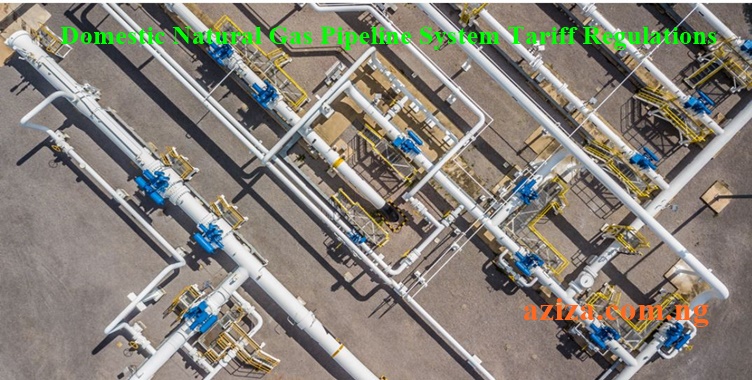This post explained Domestic gas pipeline network, the tariff principles and matrices that will underpin the economic feasibility of gas pipeline system development in Nigeria. The tariff structure and charges in oil and gas, Tariff Methodology by the Authority and offences and penalties.
INTRODUCTION
The Regulations recognize the criticality of developing a sustainable domestic gas pipeline network and set out the tariff principles and matrices that will underpin the economic feasibility of gas pipeline system development in Nigeria.
Whilst the Regulations frown on discrimination amongst shippers with similar characteristics, the Regulations embrace the principles of differentiation to cater to shippers in different classes based on certain indices such as the peculiarities of the relevant end-user market, vertically integrated arrangements, existence of shipper financing obligations, and the stage of the development of the gas pipeline infrastructure.
Read: Central Gas Supply Systems Design & Installation
The Regulations also make very interesting provisions to promote accountability and transparency in the tariff setting, and it takes into consideration market economics, such as the behavior of shippers towards the payment of agreed tariffs.
TARIFF STRUCTURE AND CAPACITY CHARGE IN OIL AND GAS
- Shippers shall be charged transportation tariff for capacity charge; commodity charge and any other charge as may be prescribed by relevant code.
- The transportation tariffs shall be determined and charged in United States Dollars or other foreign currency, and payment shall be made in such respective foreign currency or its Naira equivalent at the open market rate published by the Central Bank of Nigeria pursuant to section 122(1)(d) of the Act.
- Notwithstanding regulation 6(2) of these Regulations, the provisions of the Gas Network Code Framework Agreement shall apply.
- A gas transportation agreement existing under a gas transportation pipeline on open access or gas transportation network, shall from the commencement of these Regulations ceases to be effective and is replaced by a gas network code framework agreement.
- Transportation tariff shall be paid by shippers on monthly basis in arrears.
Read: Pipeline System License/ Permits
Tariff relating to capacity charge
- The Authority may approve different classes of capacity charge for the same gas transportation pipeline or gas transportation network.
- The classes of capacity charge under regulation 7(1) of these Regulations.
- For gas transportation networks and gas transportation pipelines on open access, each class of capacity charge shall be charged in respect of reserved capacity under gas network code framework agreements.
- The capacity charge shall be determined and charged based on a United States Dollar or other foreign currency per unit of reserved capacity, per day and payable in such foreign currency or its Naira equivalent at the open market rate published by the Central Bank of Nigeria.
- The capacity charge shall be determined by the reference tariffs pursuant to the tariff methodology determined by the Authority
Read: NCEC Certificate Registration
Tariff relating to commodity charge.
- The commodity charge shall be set to recover the cost of fuel gas and related expenses.
- A shipper shall pay commodity charge per unit of actual natural gas transported on their behalf.
- A shipper may in lieu of paying for fuel gas, provide a share of the total quantity of fuel gas to the operator in proportion to the shipper throughput of natural gas through the gas transportation pipeline or gas transportation network.
- The operator of a gas transportation pipeline on open access or gas transportation network shall ensure that fuel gas is properly metered, accounted for and sourced at free market rate in accordance with applicable regulations.
TARIFF METHODOLOGY BY THE AUTHORITY
The Authority shall determine pursuant to section 123(3) of the Act, the tariff methodology applicable to:
- new gas transportation pipelines operating on open access basis;
- new gas transportation pipelines being operated for its own account of the operator;
- the review of tariffs for existing gas transportation pipelines; and
- the review of tariffs for the existing gas transportation network.
In determining the tariff methodology, the Authority shall take into consideration:
- whether the tariff shall be charged
- the classes of capacity charges that may apply
- the methodology for determining the reference tariffs
- the methodology for adjusting the reference tariff to the real tariffs to be determined for each calendar year from which the capacity charges for each year is derived and the inflation index to be used for determining the actual capacity charges for each year.
Read: Natural Gas (LPG) Business Opportunities in Nigeria
OFFENCES AND PENALTIES
Pursuant to section 229 of the Act, a person who commits an offence under sections 228 or 230 of the Act in relation to the provisions of these Regulations shall, in addition to the penalties associated with the network code framework agreement and gas transportation agreement, be liable to an administrative penalty of not less than USD1,000,000 or its Naira equivalent at the prevailing Central Bank of Nigeria exchange rate.

